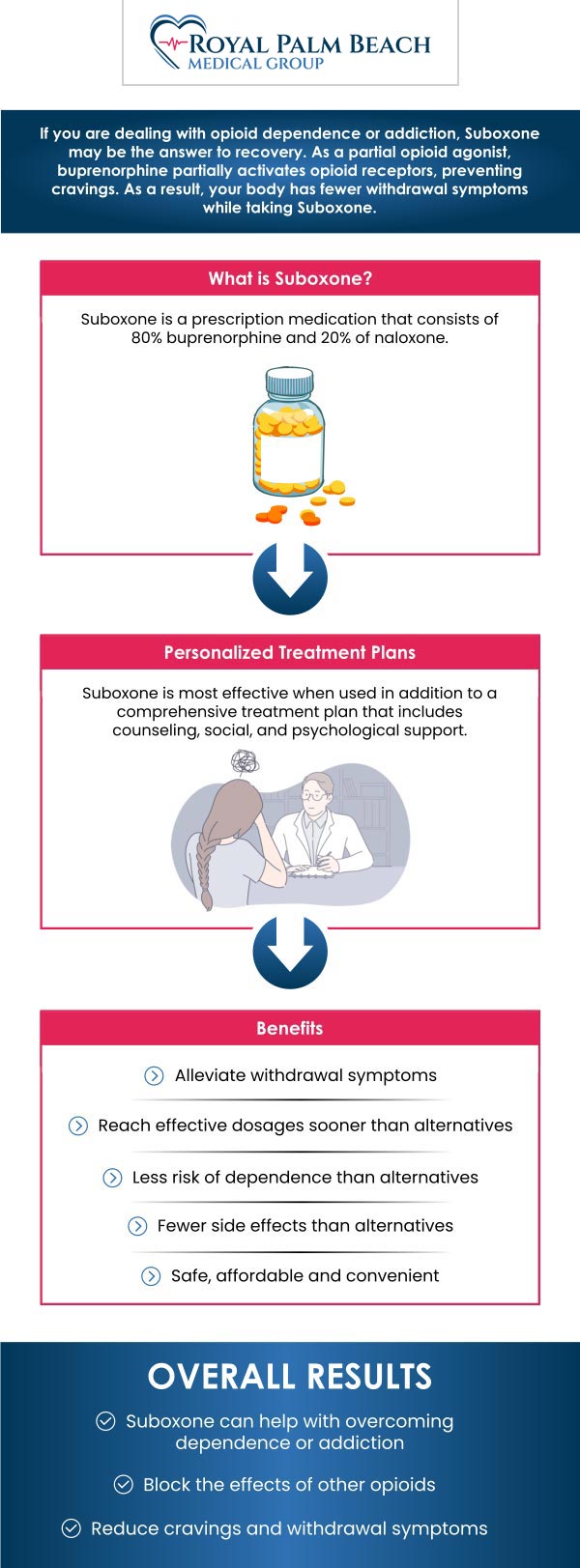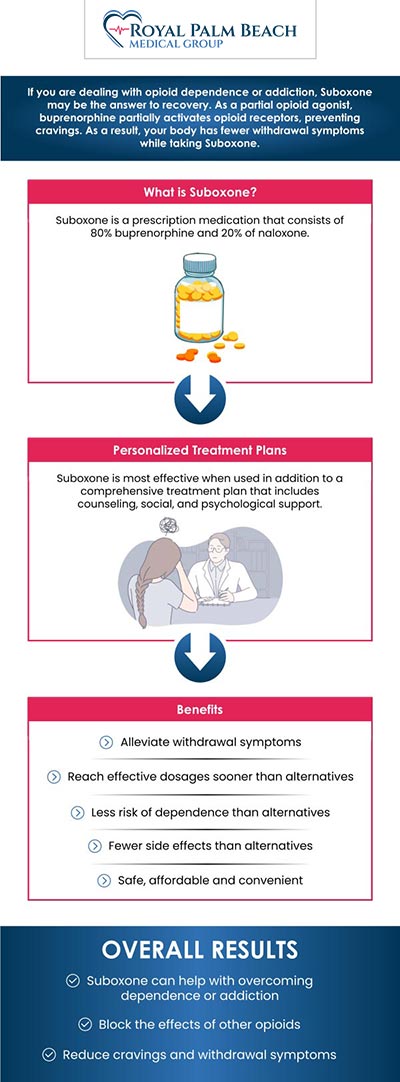Suboxone Therapy: What to Expect?
Suboxone therapy is a medication-assisted treatment designed to help individuals recover from opioid addiction. It combines buprenorphine and naloxone to reduce cravings and withdrawal symptoms, making it easier to focus on recovery. During treatment, our healthcare providers will work with you to create a personalized plan and monitor your progress. For more information, contact us or book an appointment online. We have convenient locations in Fort Lauderdale, FL, and Royal Palm Beach FL.


Table of Contents:
Who is a candidate for Suboxone therapy?
What should I expect during my first Suboxone therapy session?
What are the common side effects of Suboxone?
What happens if I miss a dose of Suboxone?
At Royal Palm Beach Medical Group, we understand the critical need for effective treatment options for individuals struggling with opioid use disorder (OUD). Suboxone therapy is designed to provide comprehensive care for those dependent on opioids, including prescription painkillers, heroin, or fentanyl. By reducing cravings, managing withdrawal symptoms, and decreasing the risk of relapse, Suboxone therapy offers a structured pathway toward long-term recovery.
Suboxone therapy can be a highly effective treatment for opioid use disorder (OUD), but it requires careful consideration to ensure it’s appropriate for each patient. Below are the key factors taken into account before initiating Suboxone treatment:
Addiction Severity: Suboxone therapy is typically recommended for individuals with severe OUD, especially those experiencing frequent and heavy opioid use. The therapy aims to stabilize these conditions and support sustained recovery.
Physical Dependence: The therapy is designed for those with physical dependence on opioids, helping to manage withdrawal symptoms and allowing the body to adjust to life without opioids.
Withdrawal Severity: Suboxone is effective in alleviating severe withdrawal symptoms such as intense cravings, anxiety, and gastrointestinal distress, which are common in individuals trying to detoxify.
Medical History and Co-Occurring Conditions: A thorough assessment of the patient’s medical history is conducted, including evaluating heart health, liver function, and respiratory health. Additionally, co-occurring mental health conditions, such as depression, anxiety, or PTSD, are addressed as part of a holistic treatment plan.
Special Considerations for Treatment:
Pregnancy or Breastfeeding: For pregnant or breastfeeding women, the risks and benefits of Suboxone therapy are carefully evaluated to ensure both maternal and fetal safety when other treatment options are not suitable.
Compliance and Support: Successful outcomes with Suboxone therapy depend on patient commitment and support. A comprehensive treatment plan that includes counseling and behavioral therapies is encouraged to foster healthier coping mechanisms and facilitate lasting recovery.
Suboxone therapy, when used appropriately, can be a key component of a successful recovery plan, but it’s essential to evaluate each patient’s unique needs for safe and effective treatment.
During your first Suboxone therapy session, you can expect a thorough and supportive process to help assess your individual needs and determine the best treatment plan for you. Here’s a general overview of what typically happens:
Comprehensive Evaluation: Your healthcare provider will begin by reviewing your medical history, including your opioid use history, physical health, and any mental health concerns. This helps them understand the severity of your addiction, your overall health, and any underlying conditions that might affect your treatment. You may also be asked about any previous attempts to stop using opioids and the challenges you faced.
Initial Dosing and Monitoring: If Suboxone is determined to be appropriate for your treatment, your provider will start by administering an initial dose. This may be done under supervision to monitor for any potential reactions, as it’s important to ensure that the medication is effective and that you do not experience severe withdrawal symptoms.
Discussing the Treatment Plan: Your provider will explain how Suboxone therapy works, including how it helps manage cravings and withdrawal symptoms. They will also discuss the goals of treatment, the expected duration, and the importance of regular follow-up visits. Additionally, they will emphasize the need for a comprehensive treatment plan, which may include counseling, behavioral therapy, and lifestyle changes to support your recovery.
Setting Expectations and Next Steps: You will be given information about how to take Suboxone, potential side effects, and how to manage any issues that arise. Your provider will also outline the follow-up schedule and any necessary adjustments to the treatment plan based on how you respond to the medication.
Overall, your first Suboxone therapy session will focus on ensuring that you receive the best care possible while laying the foundation for a successful treatment journey. Your healthcare provider will work with you to create a tailored approach that addresses both your immediate needs and long-term recovery goals.
At Royal Palm Beach Medical Group, we prioritize your safety and well-being. Our team is available to discuss any concerns and adjust your treatment plan as necessary. We encourage all patients on Suboxone to stay in close contact with their healthcare provider and report any side effects they experience. Together, we can ensure that your treatment is both safe and effective, supporting you on the path to recovery.
Common Side Effects of Suboxone:
– Nausea and vomiting
– Constipation
– Headaches, dizziness, and drowsiness
– Insomnia and psychological effects
– Sweating, fatigue, and weakness
Other effects include blurred vision, dry mouth, decreased appetite, muscle aches, joint pain, chills, sexual dysfunction, and weight loss
While rare, serious side effects like respiratory depression, seizures, coma, and death can occur, particularly with high doses or when combined with other substances such as alcohol or benzodiazepines. It is imperative to follow your prescribed treatment plan and communicate regularly with your healthcare provider.
Our team is here to support you in ensuring your treatment plan remains effective, even if you encounter missed doses.
Steps to Take if You Miss a Dose:
Immediate Action: Should you miss a dose of Suboxone, take it as soon as you remember, provided it’s within 12 hours of your scheduled time. This helps in maintaining the medication’s effectiveness.
Close to Next Dose: If more than 12 hours have passed, skip the missed dose to avoid doubling up. Resuming your regular schedule is crucial to prevent potential side effects or overdose risks.
Managing Symptoms: Missing doses can sometimes lead to withdrawal symptoms such as muscle aches, nausea, anxiety, and insomnia. If you experience severe symptoms or cravings, contact us immediately for guidance tailored to your needs.
At Royal Palm Beach Medical Group, we emphasize open communication with our patients. If you face barriers or have missed doses, please reach out to us. Our healthcare providers can adjust your treatment plan and address any issues promptly, ensuring you continue progressing on your recovery journey.
Remember, while missing a dose can be concerning, taking the right steps afterward is vital. Our team is dedicated to supporting you with professional advice and care throughout your treatment plan. For more information, contact us or request an appointment online. We serve patients from Fort Lauderdale, FL, North Lauderdale FL, Pompano Beach FL, Plantation FL, Royal Palm Beach FL, Wellington FL, Westlake FL, Golden Lakes FL, and surrounding areas.

Additional Services You May Need






